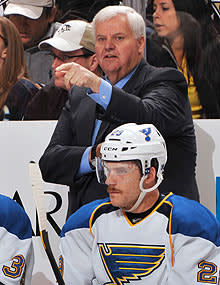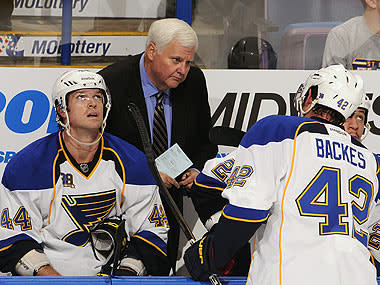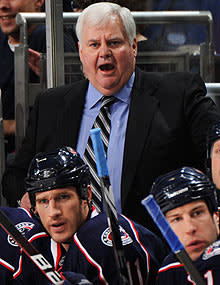Blues man: St. Louis humming Hitchcock's tune
Sure, Ken Hitchcock remembers what he said Nov. 7 when he was introduced as the coach of the St. Louis Blues. He remembers he was "not bragging but being factual" when he said "that the game's always been in slow motion" for him behind the bench.
But he also remembers how he felt Nov. 8 when he made his debut against the Chicago Blackhawks. He remembers how he felt for his first three games, in fact. The game didn't seem in slow motion at all. It felt quick. Real quick.
He figured he had a handle on everything because he had been studying video while out of work since February 2010. But this was live action, not television, and here he was clinging to a lineup card for the first time in his career, not knowing who was on the power play, not knowing who was killing penalties, not knowing a number of things that coaches are supposed to know.
"I think it's hard," Hitchcock said. "I think it's a lot harder than I said it was and a lot harder than I thought it was."
He was surprised that when the Blues took a couple of penalties, he was so harried that he didn't take the time to lift his head to see who was in the box.
"I knew somebody in our sweater was over there, but I didn't know the number," Hitchcock said. "That's when I came home and I said, 'Man, I've got to get going here.' "
And so he went home and visualized. He visualized jersey numbers. He visualized line combinations. He visualized matching lines, putting players out at the right time. He would spend at least 30 minutes visualizing, acutely aware of how competitive the NHL has become and how little margin for error there is.
"Even with the haves and the have-nots, there's very little difference between the teams," Hitchcock said. "So you make bad line matchups and you have the wrong people on the ice, you're going to lose games that you have a chance to win."
* * * * *
So when Hitchcock says it's a lot harder than he thought, what does it mean when he has made it look so easy?
Hitchcock not only won his debut, the Blues beat the Blackhawks by a 3-0 score. They have beaten several other good teams, too – the Tampa Bay Lightning, Detroit Red Wings, Florida Panthers and Washington Capitals, not to mention the Pittsburgh Penguins, on the road, holding Sidney Crosby(notes) off the scoresheet one game after his triumphant two-goal, two-assist comeback from a concussion.
The Blues are 8-1-2 since Hitchcock took over. They have allowed only 15 goals in those 11 games.
It means three things:
One, taking over a team during the season really is a tremendous challenge for a coach, even a guy that came into the job with 533 regular-season victories and a Stanley Cup on his resume.
Two, the Blues were in position for a turnaround.
Three, Hitch is a damn good coach who is just being modest in his affable way, and maybe he has evolved into a better one – or at least a different one – than he was before.
Everyone expects a boost when teams change coaches during the season. Otherwise, teams would wait till the off-season to do their dirty work.
But it doesn't always happen immediately. The Caps are 0-2 since replacing Bruce Boudreau with Dale Hunter. The Carolina Hurricanes are 0-2 since replacing Paul Maurice with Kirk Muller. (The Anaheim Ducks haven’t played yet since replacing Randy Carlyle with Boudreau; their new era starts Friday night.)
If you're changing coaches, that means you have problems, and some teams' problems run deeper than others. Some coaches are better equipped to solve them more quickly than others.
Hunter had no professional coaching experience when he took over a Caps team suffering from confidence and identity crises. Muller had no NHL head coaching experience when he took over a 'Canes team floundering near the bottom of the league standings.
Hitchcock is an experienced coach who took over a team that really wasn't that bad, a team that needed some tweaks and organization, a team primed to take the next step. The Blues started 6-7-0 under former coach Davis Payne and had five consecutive home games coming up. Effort was not an issue, either.
"Davis did a great job of that, getting everybody ready to work," said veteran winger Jamie Langenbrunner(notes).
Hitch can play it off all he wants, saying the experience has been a "wee bit of a whirlwind," pointing out that he kept getting lost on his way to the practice rink and the arena. But somehow he knew how to point the players in the right direction right away.
"I think the one thing he did is, he simplified it," Langenbrunner said. "Guys have a little better understanding of where we're going. We're all competing on the same page now instead of just running around with our heads cut off a little bit. It shows in our positioning and in our ability to really make it hard on other teams to generate anything."
The Blues are playing defensive hockey, but not the kind of sit-back, slow-it-down hockey Hitchcock once used to win the Cup with the Dallas Stars – the kind of hockey with which he is still associated even though he went on to coach the Philadelphia Flyers and Columbus Blue Jackets. This is the new, faster NHL, and this is a younger, faster team. The Blues are smart and structured, but their tempo is crisp. Short shifts. Go hard. Keep coming. Support each other.
Hitch can say the game felt quick at first, but look at how his team is playing.
"Obviously we've just had an overall quicker pace to our game and played a little bit better," said general manager Doug Armstrong.
Hitchcock is known for being an outstanding tactician, and his players rave about his game plans and in-game adjustments. The Blues earned a 3-2 overtime victory over the Penguins on Nov. 23 partly because they took away the Pens' patented breakout – the one where they throw the puck up the strong-side wall and generate speed through the neutral zone, the one that led to Crosby's dramatic comeback goal two nights earlier.
The Blues already were allowing few shots before Hitchcock arrived, but Armstrong said that was a bit skewed because they were often playing from behind – pushing on the attack while the other team was playing prevent defense. But now the Blues are leading the league in shots against (25.6) and goals against (2.00) while playing from ahead more often.
Captain David Backes(notes) and center T.J. Oshie(notes) have responded particularly well to the coaching change. Guys like center Patrik Berglund(notes) and winger Chris Stewart(notes) are killing penalties now, because Hitchcock believes in getting his better players more involved in the game. The penalty kill has improved.
Goaltender Brian Elliott(notes) has continued to be one of the biggest surprises of the season. After struggling with both the Colorado Avalanche and Ottawa Senators last season, he signed a one-year, $600,000 deal to back up Jaroslav Halak(notes) in St. Louis. Now he is 10-1-0 and leads the NHL in goals-against average (1.31) and save percentage (.951).
"If we knew that this was going to be the outcome," general manager Doug Armstrong cracked, "we would have signed him to a three- or four-year deal."
But after a slow start, Halak has been better lately, too. Most everything and everyone has clicked or continued to click under Hitchcock.
"I think he's done a very good job of trying to get everybody to be part of the program quickly," Armstrong said, "and we just have to continue with that."
* * * * *
A main subject when Hitchcock was hired was his ability to adapt not only his strategy to today's NHL, but his approach to today's player. There are many stories about Hitch's high-strung tendencies. You've heard them. The Blues have heard them, too.
"You've always got to keep an open mind when a guy comes in, but you also do your research," said defenseman Barret Jackman(notes), who declined to reveal his sources. "You hear some stories – good and bad."
Hitch has gotten mad already.
"Oh, don't you worry about that," said a smiling Langenbrunner, who also played for Hitchcock in Dallas. "He still has his moments. He's a perfectionist."
But Hitchcock hasn't had that much to be mad about yet, and he insists he is more serene and secure now at this stage of his career. He knows that he knows the X's and O's. He isn't worried whether the players like him. He isn't bothered by what people say about him.
"I think it's like a lot of older coaches," said Hitchcock, who turns 60 on Dec. 17. "We just get calm, because we're confident in those areas, so then we almost develop a teacher mentality. We're still as competitive as hell, but we come at it from a different angle."
Today's players? It's not that you can't get mad at them. It's not that you can't yell at them. It's that you can't rant and rave without giving them a good reason and a solution to the problem.
"I think this age of players wants the information," Hitchcock said. "They want it now, but you better make sure it's right. So they don't mind getting critiqued and they don't mind getting criticized, but they also want to know how to fix it."
Said Armstrong: "[Hitchcock is] a demanding coach, but we need a demanding coach. … His patience hasn't been tested, but I think when they do [test his patience], he'll find a different way to go about getting his point across than maybe he had to in the past."
The Blues are bound to test Hitchcock's patience. It's unlikely the goaltending will continue to be this great. It's unlikely the goals against will remain this low. It's unlikely the team will keep winning at this pace.
Hitchcock is going to have to find a way to generate more offense. The power play – which Hitchcock said would take one practice to fix – produced a goal in each of Hitch's first two games but has gone 2-for-32 since. It ranks last in the league (8.8 percent), just as it did before he was hired.
But the Blues have been winning while shorthanded. Two of their best players – David Perron(notes) and Andy McDonald(notes) – have been out with concussions, among other injuries. That says something.
"We are going through that phase like a lot of teams, missing a lot of players and still getting points, and the reason we're getting points is that we have responded," Hitchcock said. "We've dug in, and I think that's the thing that's impressed me the most. When I've asked for a little more, they've given me a little more."
And there seems to be even more to give.
Jackman said the Blues have "turned the corner," saying Hitchcock took the great chemistry that already existed in the room and "just really harnessed that and put it towards the game."
The game seemed quick to Hitch at first. But he got the Blues playing quicker, and he put them in playoff position quickly. They might be there to stay.
"We're not a flashy team," Jackman said. "We're not going to be a team that probably blows out teams 8-1. But we're a very sound team. We're going to fly under the radar and keep collecting our wins …"
Jackman smiled.
"And you never know what happens."



